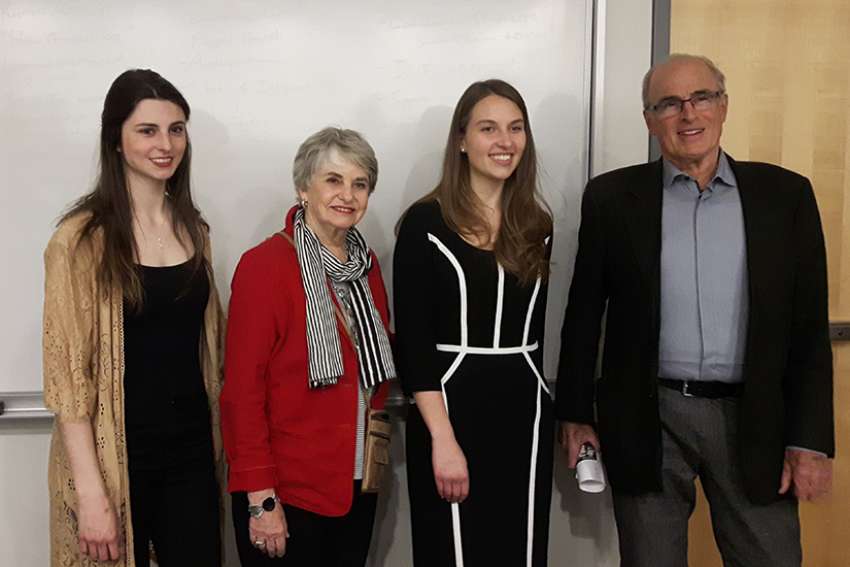That was the overwhelming sentiment at Wilfrid Laurier University on April 5 when about 200 people attended a debate entitled “Abortion: Whose Body? Whose Choice.” The event, presented by Laurier’s pro-life club LifeLink, featured a late-term abortionist, Dr. Fraser Fellows, and, on the pro-life side, Oriyana Hrycyshyn of the Canadian Centre for Bio-Ethical Reform.
Christine Schuknecht, president of LifeLink, called the night a “big success” simply because the event took place.
“We wanted to have a debate just to open up the conversation. Abortion is such a controversial topic and everyone gets emotionally charged whenever it comes up so to be able to have a debate means that we are opening up the door to having this discussion at all.”
The debate, moderated by National Post columnist Barbara Kay, also featured master of ceremonies Lindsay Shepherd. She is the Laurier graduate student who was at the centre of a free speech controversy last fall after being reprimanded for holding a tutorial discussing psychology professor Jordan Peterson’s views on the use of gender-neutral pronouns.
“I don’t think it’s a crazy prediction to say that in 10 years, debates like this one tonight would be stopped from taking place,” Shepherd said. “There were many people who said that our event tonight should not even happen because the debate on abortion is over.”
The appreciation for an opportunity for free speech was a sentiment shared by all those participating.
“Personally, I know where I stand,” said Warren Van Sydenborgh, 24-year-old McMaster Mechanical Engineering graduate. “I stand on the life of the unborn… I am Christian. I want to represent Christ in all things. The Bible is the basis for truth but it doesn’t mean I can’t listen to other perspectives.”
Like Van Sydenborgh, others in attendance were eager to share their opinion on the topic through respectful conversation.
One 46-year-old attendee, who wished to remain anonymous, attended because she is a “grateful recipient of an abortion (and) grateful of the right to choose.”
“When you work with youth who have been abused — neglected, sexually abused, emotionally abused, physically abused — you see that there are some situations that they shouldn’t come into life around.”
The debate itself allowed for opening arguments from both debaters, a cross examination, as well as a question-and-answer period.
Fellows opened the debate explaining his perspective as a strong supporter for abortion in Canada.
“I’m an ardent advocate of freedom of expression and protest. Not to protest women’s right to choice, rather society’s failure to assist in preventing most abortions in the first place,” said Fellows. “What I mean by this is that we have the infrastructure, the financial and educational wherewithal to significantly reduce our abortion rate.”
Hrycyshyn chose to begin by telling the story of her niece, born at 23 weeks and one day, an age at which it is still legal to abort a baby in Canada.
“When going back to the Universal Declaration of Human Rights it is important to note that the term ‘human’ is used here because the term ‘human’ is an objective term that can be proven scientifically, unlike the legal term ‘person’ which has had a changing definition throughout history,” she said. “The language of personhood in essence is the language of discrimination.”
Throughout the debate, attendees listened respectfully, applauding every once in a while after a particularly strong argument was made. Overall, the audience seemed to side with Hrycyshyn, although attendees continued the debate at a social reception afterwards.
(Jamieson, 17, is a Grade 12 student at Monsignor Doyle Catholic Secondary School in Cambridge, Ont.)
Laurier hosts open dialogue on a ‘closed’ debate
By Kate Jamieson, Youth Speak NewsThere’s no question abortion is a divisive issue. But both pro-life and pro-choice sides can at least agree on one thing — having a civil debate is important.
Please support The Catholic Register
Unlike many media companies, The Catholic Register has never charged readers for access to the news and information on our website. We want to keep our award-winning journalism as widely available as possible. But we need your help.
For more than 125 years, The Register has been a trusted source of faith-based journalism. By making even a small donation you help ensure our future as an important voice in the Catholic Church. If you support the mission of Catholic journalism, please donate today. Thank you.
DONATE

